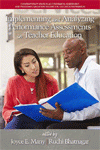
Implementing and Analyzing Performance Assessments in Teacher Education
Edited by:
Joyce E. Many, Georgia State University
Ruchi Bhatnagar, Georgia State University
A volume in the series: Contemporary Issues in Accreditation, Assessment, and Program Evaluation Research in Educator Preparation. Editor(s): Joyce E. Many, Georgia State University.
Published 2017
Teacher education has long relied on locally-developed assessments that lack reliability and validity. Rigorous performance-based assessments for preservice teachers have been advanced as one possible way to ensure that all students receive instruction from a high-quality teacher. Recently, performance-based assessments have been developed which focus on the application of knowledge of teaching and learning in a classroom setting. Our book explores factors related to the implementation of teacher performance assessments in varying state and institutional contexts. The contributors, teacher educators from across the country, focus on what was learned from inquiries conducted using diverse methodologies (quantitative, qualitative, self-studies, and mixed methods). Their research encompassed faculty, supervisors, cooperating teachers, and students’ perceptions and concerns of teacher performance assessments, case studies of curricular reform and/or resistance, analyses of experiences and needs as a result of the adoption of such assessments, and examinations of the results of program alignment and reform. The chapters showcase experiences which occurred during high-stakes situations, in implementation periods prior to high-stakes adoption, and in contexts where programs adopted performance assessments as an institutional policy rather than as a result of a state-wide mandate.
Endorsements
The chapters compiled for Implementing and Analyzing Performance Assessments in Teacher Education edited by Joyce E. Many and Ruchi Bhatnagar, present a thoughtful look at the challenges and solutions embedded in the adoption of teacher performance assessments for preservice teachers. Most chapters feature edTPA, the most commonly used performance assessment now mandated in numerous states and used voluntarily by other programs across the country, and reveal how such assessments shine a bright light on the problems of practice in teacher preparation (stressful timelines, faculty silos, communication with P-12 partners, etc.) when new requirements disrupt the status quo. Each chapter tells a valuable story of performance assessment implementation and approaches that offset compliance in favor of inquiry and educative experiences for candidates and programs alike.
Andrea Whittaker, Ph.D edTPA National Director Stanford University
Graduate School of Education
UL-SCALE
Many and Bhatnagar launch the AAPE book series with a curated volume highlighting the contexts in which teacher educators implement and utilize performance assessments in educator preparation. Together, the chapters present research from various viewpoints—from candidates, faculty, university supervisors, and clinical partners—using diverse methodologies and approaches. The volume contributes significantly to the program assessment research landscape by providing examples of how performance assessments inform preparation at the intersection of praxis and research, and campus and field. These chapters provide a critical foundation for teacher educators eager to leverage performance assessments to improve their programs.
Diana B. Lys, EdD.
Assistant Dean of Educator Preparation and Accreditation
School of Education
University of North Carolina at Chapel Hill
CONTENTS
Introduction. The Evolution of Teacher Performance Assessments As a Measure of Accountability, Carla L. Tanguay. From Isolation to a Community of Practice: Redefining the Relationship of Faculty and Adjunct University Supervisors During the Implementation of edTPA, Sharilyn C. Steadman and Ellen E. Dobson. Faculty Investment in Student Success: A Four-Year Investigation of edTPA Implementation, Gaoyin Qian, Harriet Fayne, and Leslie Lieman. Mandates Revisited: One Coordinator’s Story of Cultivating Collegiality and Inquiry Through a Professional Learning Community, Holley M. Roberts. The Power of Supports to Improve edTPA Outcomes, Kathleen Fabrikant, Cynthia Bolton, Cindy S. York, and Angie Hodge. Cognitively Guided Instruction as a Means of Preparing Elementary Teacher Candidates for edTPA Mathematics Assessment Task 4, Susan Swars Auslander, Stephanie Z. Smith, and Marvin E. Smith. Not Just for Preservice Teachers: edTPA as a Tool for Practicing Teachers and Induction Support, John Seelke and Xiaoyang Gong. Forcing Me to Reflect: Preservice and Novice Teachers’ Reflective Thinking in Varied School Contexts, Dianna Gahlsdorf Terrell, Kathryn McCurdy, Megan L. Birch, Thomas H. Schram, and Page Tompkins. State Education Agency Use of Teacher Candidate Performance Assessments: A Case Study of the Implementation of a Statewide Portfolio-Based Assessment System in Kansas, Stephen J. Meyer, Emma V. Espel, and Nikkolas J. Nelson. Using the Concerns-Based Adoption Model To Support edTPA Coordinators and Faculty During the Implementation Process, Joyce E. Many, Shaneeka Favors-Welch, Karen Kurz, Tamra Ogletree, and Clarice Thomas. About the Editors. About the Contributors.
-
Paperback978-1-64113-119-3
Web price: $45.04 (Reg. 52.99)
-
Hardcover978-1-64113-120-9
Web price: $80.74 (Reg. 94.99)
- eBook978-1-64113-121-6

- EDU053000 - EDUCATION: Training & Certification
- EDU037000 - EDUCATION: Research
- EDU000000 - EDUCATION: General
-
 (Re)Envisioning Social Studies Education Research
Current Epistemological and Methodological Expansions, Deconstructions, and Creations
(Re)Envisioning Social Studies Education Research
Current Epistemological and Methodological Expansions, Deconstructions, and Creations
-
 A Practical Guide to Exemplary Professional Development Schools
A Practical Guide to Exemplary Professional Development Schools
-
 Contemporary Perspectives on English as a Medium of Instruction
Contemporary Perspectives on English as a Medium of Instruction
-
 Effectively Using Data for Educator Preparation Program Improvement
Effectively Using Data for Educator Preparation Program Improvement
-
 Linking Teacher Preparation Program Design and Implementation to Outcomes for Teachers and Students
Linking Teacher Preparation Program Design and Implementation to Outcomes for Teachers and Students
-
 Recipe for Success
Building a Sustainable Quality Assurance System
Recipe for Success
Building a Sustainable Quality Assurance System
-
 The Handbook for Aspiring Higher Education Leaders
The Handbook for Aspiring Higher Education Leaders

